
4/11/2007. the war lord
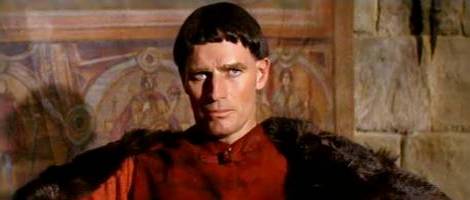
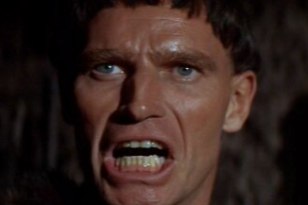
john cribbs
In October 2006, Funderburg and Cribbs set out to watch at least 200 movies over the course of the next 200 days. They both watched a different slate of films and wrote about every single one; from epic high art masterpieces such as Jean-Pierre Melvile's Army of Shadows to half-forgotten oddities like I Bury the Living to quality-deficient garbage like Charles Band's Tourist Trap. The Pink Smoke is reprinting their writings about the grueling experiment in cinematic endurance - due to the length of the essays, some of the entries such as Berlin Alexanderplatz and The War Lord will be broken out individually.
4.11. The War Lord
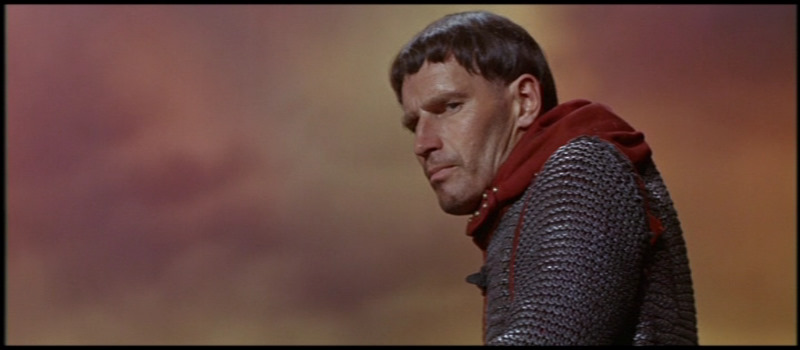
The War Lord is what you'd call a real crossroads movie, one that bridges the gap between romantic Hollywood star vehicles of the Golden Era and the grittier, grimier films of the American cinema "revolution" of the late 60's and early 70's. The stars of the movie - Charlton Heston, Richard Boone, Guy Stockwell, Henry Wilcoxon* - get to wear chain mail coifs and share dialogue like "That naked strumpet wears our father's ring!" while standing on decorated soundstage sets or against sunset red matte paintings on horseback, but at the same time they're old and tired and look like the Wild Bunch, as if the years of blood and mayhem can't be washed off their skin. The same kind of sappy big screen romance you'd find in any Middle Ages period epic from the 50's and 60's plays out between Heston and Rosemary Forsyth, but it's a little bit sleazier and more uncomfortable - a scene where Heston's hunting dogs rip off Forsyth's clothes and he leers at her as she hides her nudity by remaining shoulder-deep in pond water has that same kind of Faye Dunaway hanging out naked at home in the opening of Bonnie and Clyde or naked Anne Bancroft seducing Dustin Hoffman in her daughter's bedroom level of fun and sordidness. I can't remember seeing a movie where the production looks so clean and crisp but the actual world of the film feels dirty: not just the sets and the actors and the costumes but the vileness of the characters and their vulgar activities. It's a weird combination but it definitely makes the film more interesting.
The other thing that makes the movie notable is that it was a medieval dress rehearsal for Planet of the Apes, being the first collaboration between Heston and director Frankin J Schaffner (Dr. Zaius himself Maurice Evans even has a supporting part). It shares some themes with that classic film, like man entering a society his cultural background doesn't mesh with and in-fighting that threatens to tear a government apart. And it's neat that their first project was set in the distant past while the follow-up went to the far future. One of the screenwriters is the guy who fronted for Dalton Trumbo on Gun Crazy. It was based on a play by the guy who created "The Outer Limits," which is funny considering Rod Serling wrote the screenplay for 'Apes.
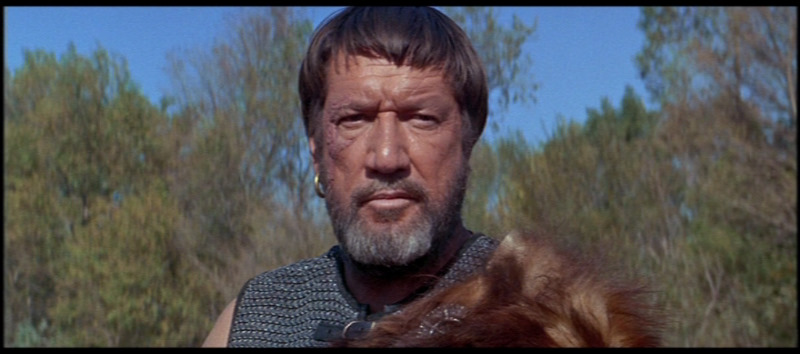
Heston plays Chrysagon de la Cruex, a Norman knight charged with defending a coastal fiefdom peopled with primitive Druids sometime in the 11th century. He has a small band of loyal soldiers who've ridden with him for two decades worth of crusades and bloody battles, including his aide de camp Bors (a badass Richard Boone) and snippy brother Draco. They're a weird set of soldiers - for instance there's a creepy, dubbed midget who everyone just tries to ignore - but you kind of like them because they've clearly been through a lot of shit together, they have a warrior's weariness about them and share a kind of veteran's bond, especially Heston and Boone. In fact the minute they get to the village they find some Vikings, led by Heston's mortal enemy, are just starting to pillage the place and they have to fight them off without even getting a chance to stop and stretch after a long journey. It's a tough life for these guys, so you kind of understand Heston's position once they've gotten rid of the raiders and his attitude instantly turns to "Ok I just saved you guys, where's my damn room so I can get these boots off and chill out for a while?"
Unfortunately this sense of self-righteousness sticks with him for the rest of the movie and gets him into all sorts of trouble, especially when he falls for a local maiden played by Forsyth. Having been sent by the Duke of Ghent to protect what is basically a big slab of land enveloped by swamp, given only a smelly, one-torrent fortess to stay in (the previous lord's decaying body still occupies Heston's new bed!) and a bunch of heathen brutes to govern really turns out to be the straw that breaks the camel's back. Although Heston never draws parallels between the two things, his soldier's fatigue after all those campaigns - "I sweated in that damn dirty armor twenty years!" (apparently, Schaffner and Heston have some sort of copyright claim on combining the words "damn" and "dirty") - has given him a sense that he's earned the right to settle down into a well-earned retirement, and that the common people actually owe him something for keeping them safe all these years. This extends to Forsyth, a buxom babe and the only actor in the movie who looks like she's had a shower recently. Even though she's betrothed to one of the villagers, Heston works himself up into a fever over her and finally decides to invoke the feudal right of "Droit de Seigneur," which allows him to take the girl on the night of her marriage (sort of a pagan version of primae noctis I guess). Needless to say this ruins the wedding reception and ultimately leads to revolt and besieging of the fortress by commoners and Vikings alike.
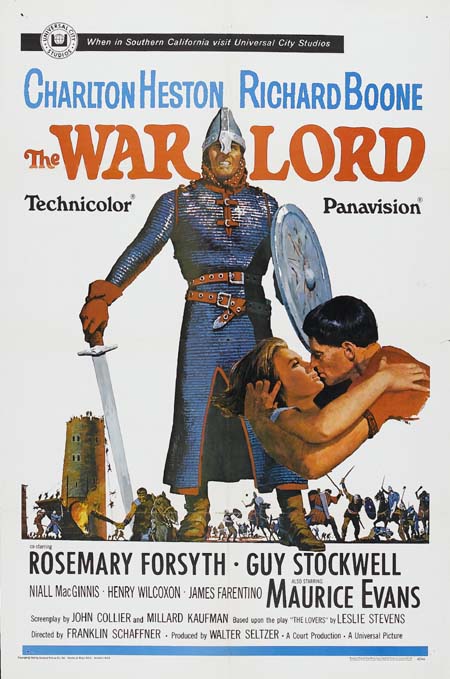 I guess this must have been the start of movies depicting the Middle Ages as less a romantic, Arthurian golden age of knights in "shining armor" and more of the sort of dirty and violent mess that it actually was. Between rampant lawlessness, consistent war among the kingdoms and the outbreak of plague, this movie posits, it might not have been a very fun time to be alive. The movies I was most reminded of were Verhoeven's Flesh & Blood and Boorman's Excalibur, but mostly I couldn't help thinking of Monty Python and the Holy Grail, particularly in shots of the pathetically small army hanging out in a single decrepit castle looking uncomfortably out of place in their chain mail and armor. I want to say the key difference was the Pythons' obvious parody of those classic Hollywood adventure yarns, but I think maybe Schaffner self-consciously knew that he was using the traditional format only to do away with it. Saying these guys are like the Wild Bunch wasn't a far stretch; the well-played, one-dimensional Western genre had already been retooled into a darker examination of complicated morals in an amoral era with mature themes of loneliness and obsession by the mid-60's and War Lord feels like a logical extension of that into the similarly untamed land of the medieval movie.** Heston's knight isn't some romantic hero - he's a bitter, selfish old dude with a queer haircut. The character is sympathetic enough that the movie makes for a classic star vehicle for Heston, except that this guy's intentions are questionable and his actions despicable, even if the motives behind them are legit. Sure, he gets the girl and in the end sacrifices himself to stop the violence, but that just feels like the old formula dictating the ending of an otherwise different approach to this kind of material. The title itself (and the movie's poster with a giant Heston towering over his little toy soldiers) seems like Heston is going to come off as a strong, imposing figure, making it all the more surprising that he turns out to be so powerless and reviled by the people he's supposed to be governing.
I guess this must have been the start of movies depicting the Middle Ages as less a romantic, Arthurian golden age of knights in "shining armor" and more of the sort of dirty and violent mess that it actually was. Between rampant lawlessness, consistent war among the kingdoms and the outbreak of plague, this movie posits, it might not have been a very fun time to be alive. The movies I was most reminded of were Verhoeven's Flesh & Blood and Boorman's Excalibur, but mostly I couldn't help thinking of Monty Python and the Holy Grail, particularly in shots of the pathetically small army hanging out in a single decrepit castle looking uncomfortably out of place in their chain mail and armor. I want to say the key difference was the Pythons' obvious parody of those classic Hollywood adventure yarns, but I think maybe Schaffner self-consciously knew that he was using the traditional format only to do away with it. Saying these guys are like the Wild Bunch wasn't a far stretch; the well-played, one-dimensional Western genre had already been retooled into a darker examination of complicated morals in an amoral era with mature themes of loneliness and obsession by the mid-60's and War Lord feels like a logical extension of that into the similarly untamed land of the medieval movie.** Heston's knight isn't some romantic hero - he's a bitter, selfish old dude with a queer haircut. The character is sympathetic enough that the movie makes for a classic star vehicle for Heston, except that this guy's intentions are questionable and his actions despicable, even if the motives behind them are legit. Sure, he gets the girl and in the end sacrifices himself to stop the violence, but that just feels like the old formula dictating the ending of an otherwise different approach to this kind of material. The title itself (and the movie's poster with a giant Heston towering over his little toy soldiers) seems like Heston is going to come off as a strong, imposing figure, making it all the more surprising that he turns out to be so powerless and reviled by the people he's supposed to be governing.
Besides having an authentically grimy look and more accurate attention to period detail, the movie does a great job revealing how politics in this kind of feudal government must have worked. The relationship isn't good for anyone: the serfs basically want to be left alone while Heston and his brother look down on subjects and their Druidic, paganistic ways. At one point Heston commands that they be "handled softly," as if they were a bunch of sensitive kids who could act out at any second. We're dealing with a period where Christianity is just becoming the dominant religion in Europe and cultural differences have already made things tense out the outset, so it becomes even more strained when Heston uses the Druid's beliefs and superstitions to manipulate them into obsequiousness. Heston grew up as a noble, but his father's loyalty as a soldier resulted in his family losing everything, creating in him a deep resentment for the system in general, one that negatively affects his treatment of the people in the village. So the fact that the big climax involves these guys taking up arms and storming the castle is hardly surprising.
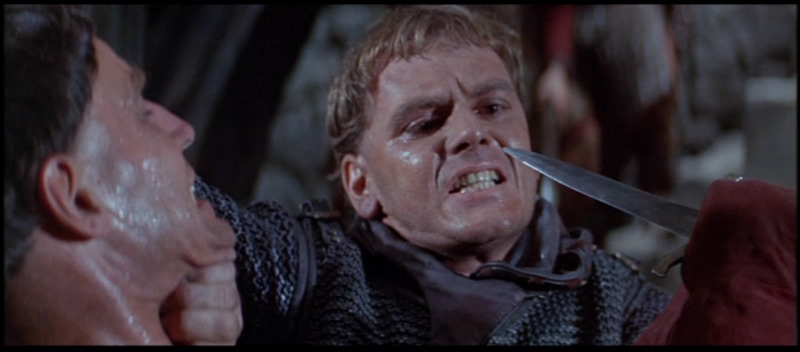
All that progress aside, the movie delivers the goods in its rousing final action scene so sword and arrow purists needn't be disappointed. Once they break out the catapults you know it's on (only complaint: all the battles are set during the day, so no night arrows). Particularly awesome is one inspired sequence where Richard Boone has to rappel down the fortress tower into to a half-sunken boat to recover its anchor so they can use it to get the gate back up after the enemy has managed to bring it down and enter the castle. A funny side note: the action seemed to me to be sped up, like it was shot at 12 frames per second. I kind of remembered that some movies from this era did weird stuff like that, and while it made everything look funny like a Mel Brooks movie or something I figured it also made Charlton Heston move faster so I went with it. Then my girlfriend pointed out that I had accidentally hit the speed button on the dvd controller so the movie had been playing quicker than it should. I hadn't noticed because the slow dialogue scenes didn't seem any faster than they should be. Anyway, whoops!
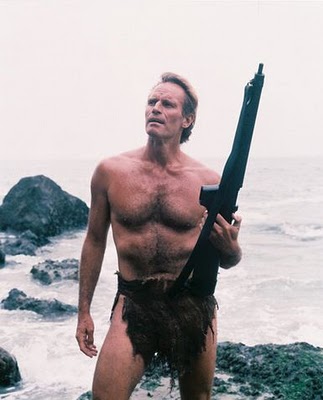 There's a lot to recommend this movie, and of course Planet of the Apes, and that makes Frankin J Schaffner's career trajectory all the more depressing. I guess Patton has its moments, but Papillon, The Boys from Brazil, and Nicholas and Alexandra are all examples of great ideas that fail due to tedious pacing and obvious directorial choices. I've never seen the Hemingway flick he made with George C Scott but I haven't heard anything good about it either. After that he adapted a Robin Cook novel, and like Sam Peckinpah's work around that same time everything he did started to feel just like that: indistinctive, forgettable paperback genre novels left on the bus. One of his last movies was the Van Damme-less Lionheart, another medieval epic with Eric Stoltz and Gabriel Byrne. I'm sure it's terrible, but I'd be willing to give it a shot. Also I should check out his early 60's stuff, of which I am totally ignorant (especially The Stripper, which received an Academy Award nomination for...best costumes?? What a cuckoo world we live in!)
There's a lot to recommend this movie, and of course Planet of the Apes, and that makes Frankin J Schaffner's career trajectory all the more depressing. I guess Patton has its moments, but Papillon, The Boys from Brazil, and Nicholas and Alexandra are all examples of great ideas that fail due to tedious pacing and obvious directorial choices. I've never seen the Hemingway flick he made with George C Scott but I haven't heard anything good about it either. After that he adapted a Robin Cook novel, and like Sam Peckinpah's work around that same time everything he did started to feel just like that: indistinctive, forgettable paperback genre novels left on the bus. One of his last movies was the Van Damme-less Lionheart, another medieval epic with Eric Stoltz and Gabriel Byrne. I'm sure it's terrible, but I'd be willing to give it a shot. Also I should check out his early 60's stuff, of which I am totally ignorant (especially The Stripper, which received an Academy Award nomination for...best costumes?? What a cuckoo world we live in!)
One final aside: any time I hear the term "war lord," all I can think of is Phil Hartman playing Bill Clinton in that classic SNL sketch where he's explaining foreign policy by eating the customers' food. "War Lords!"
* From Caddyshack! "There is no god.."
** Interestingly enough, most of those "darker" Westerns were helmed by the great Anthony Mann, who ended his career on the very traditional medieval flick El Cid, another movie that ends with Charlton Heston dead/dying his horse.
home about contact us featured writings years in review film productions
All rights reserved The Pink Smoke © 2010